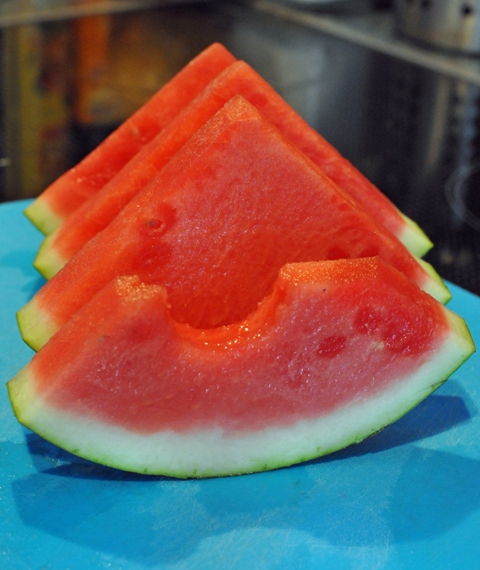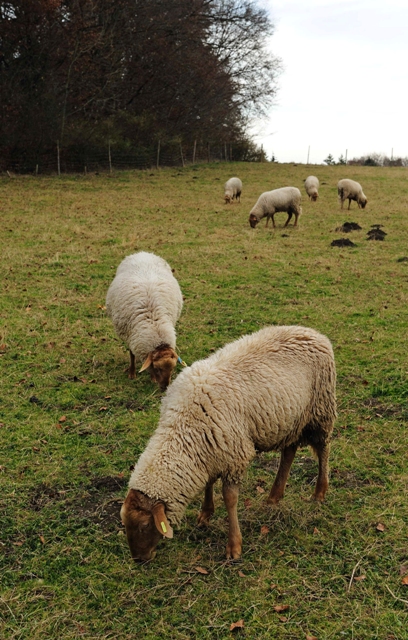As I investigated the Schafskälter, I stumbled upon other Bavarian weather folklore, which collectively are known as the Bauernregeln ("Farmers' rules"). They typically are little rhyming sayings dealing with weather prediction - similar to our "Red sky at morning, sailors take warning..." and "March comes in like a lion and out like a lamb." Different from the Anglo-American ones, many of these use the name of a saint to denote the timing (based on the date of the Saints' feast days). Not a surprise, really, as the Catholic church played a much greater role in daily life in old Bavaria than it did in the early days of the US.
With the Schafskälter, the Eisheilige, and the Siebenschläfer, the past 6 weeks have been quite full of activity and proverbs!
The Ice Saints (Eisheilige) are a cold snap in May, which farmers and gardeners expect to be the last frost of the season. Gardeners are admonished to "Die Eisheiligen abwarten" ("Wait for the Ice Saints") before doing serious planting.
In the Julian calendar, this cold snap coincided with the feast days of St. Mamertus (11 May), St. Pancras (12 May), St. Servatius (13 May), St. Boniface (14 May) and St Sophie (15 May), hence the view that the saints brought the cold weather that ends with the day of "Kalten Sophie" ("Cold Sophie"). However, with the timing changes caused by adopting the Gregorian calendar, today this cold weather usually falls a week later in May.
The Siebenschläfer ("Seven Sleepers") is a pivotal day in weather forecasting, along the lines of American Groundhog Day. Legend has it that the weather we have on the Siebenschläfer day is representative of the weather for the next few weeks. "Wenn die Siebenschläfer Regen kochen, so regnets vier ganze Wochen,"says the rule ("When the Seven Sleepers cook up rain, it will rain for 4 whole weeks").
The name refers to the old Christian and Muslim legend of the Seven Sleepers (though it also is the name for the dormouse), who were martyrs who went into a cave to pray before their executions, fell asleep, and awoke a century or two later to find the world completely changed. The meteorological explanation is that the jet stream settles into position around the end of June, thus often bringing stable (good or bad) weather in Central Europe for the next weeks. While the memorial day for the Seven Sleepers is celebrated on 27 June, for weather purposes it likely is around 7 July today (again due to changing from Julian to Gregorian calendars).
Since the weather yesterday (27 June) was wonderfully warm and perfect, I'm hoping this Bauernregel holds true! Just to be safe, I'll check in again on the 7th next week. We could use some warm days after the rainy cool of the Schafskälter days!
A few Bauernregeln: (sadly they lose the rhyme in translation)
Pflanze nie vor der Kalten Sophie - Never plant before Cold Sophie"
Corpus Christi schön und klar, guter Wein in diesem Jahr - "When Corpus Christi is lovely and clear, we'll have good wine this year"
Je nasser ist der Februar, desto nasser wird das ganze Jahr - "The wetter February is, the wetter will be the whole year
Peter und Paul hell und klar bringt ein gutes Jahr - A light and clear Peter and Paul brings a good year" (tomorrow, the 29th)
It's in German, but there's a whole long chronological list of Bauernregeln and feast days of meteorological significance on Wikipedia.
Update on Wednesday, July 20, 2011 at 12:56 by
 Frau A
Frau A
While I definitely buy into the Schafskälter as an annual phenomenon, I'm afraid that the Siebenschäfer might also work this year too.
27 June was a lovely warm sunny summer day, but supposedly the modern date (accounting for changing from Julian to Gregorian calendars) is around 7 July.
July 7 was a very strange day, mixed with hot sunny spells and cold rain and thunderstorms all in the same day. Kind of like Texas weather, except that the drop in temperature here is much more severe and it gets much colder.
I wasn't quite sure what that meant, but the weather since then has also been a strange mix, with a lot of rain. And many days that have swift changes from sun to storms and back to sun. Luckily we had almost a week of beautiful weather the week our friends from Dallas visited (the storms all were at night so didn't interfere with plans).
I'm now looking forward to the Hundestage!
 Tuesday, August 23, 2011 at 9:00
Tuesday, August 23, 2011 at 9:00 






